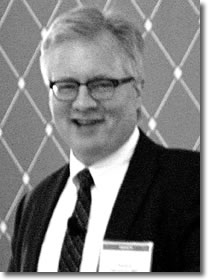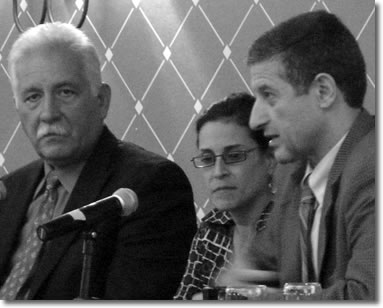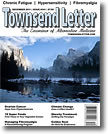|
On September 23 and 24, 2011, the Institute for Medical Studies, in partnership with Klaire Labs, a division of ProThera Inc., sponsored the Fifth Annual Probiotic Symposium on "Putting Probiotics into Practice." The symposium was organized and supported, in part, by an unrestricted educational grant from Klaire Labs, and held in Old Town Alexandria, Virginia. A distinguished international faculty reviewed the vital role of the gastrointestinal microbiota in the normal development and function of the immune and gastrointestinal systems, and highlighted the emerging awareness of the microbiota's contribution to brain maturation and modulation of pain and stress perceptions.
The faculty emphasized the importance of acquiring a healthy, balanced microbiota during infancy for health throughout life. Speakers outlined the complex role of gastrointestinal dysbiosis in the development of gastrointestinal disorders and systemic diseases such as diabetes mellitus, obesity, and metabolic syndrome. Basic and clinical research on the efficacy and safety of probiotics and prebiotics to correct intestinal dysbiosis was presented.
Dr. Stuart Erner, a prominent internist and clinical investigator practicing in Albany, New York, moderated the symposium.
 Dr. Patrick Hanaway, an internationally known and respected family practitioner and integrative holistic physician, delivered a highly enlightening overview of normal acquisition and function of the intestinal microbiota, titled "Teach Your Children Well." Dr. Hanaway noted that mammalian gut microflora is the most complex ecosystem on the planet and is responsible for a host of vital metabolic, trophic, and protective activities vital for health. He set forth the observation that there is a constant state of balanced chronic inflammation in the gastrointestinal tract that is essential for the development and function of the immune system. This balanced inflammation is due primarily to the immune response to the commensal microflora and ingested transient microorganisms termed "old friends," and allows the immune system to learn to distinguish "friend" from "foe." Dr. Hanaway showed that intestinal dysbiosis is multifactorial and may be related to mode of delivery at birth, maternal dysbiosis, medical practices such as antibiotics, poor diet, and other factors. He stated that the greater the degree of dysbiosis and unhealthy inflammatory response, the greater the need for higher doses of probiotic organisms. Dr. Hanaway concluded by introducing metagenomics, the composition of the gut microbiota, and contrasting it with the concept of metabolomics, which is the metabolic activities of the microbiota. He emphasized the importance of the presence of diverse functions in health, which may be provided by a number of different microbial species. Dr. Patrick Hanaway, an internationally known and respected family practitioner and integrative holistic physician, delivered a highly enlightening overview of normal acquisition and function of the intestinal microbiota, titled "Teach Your Children Well." Dr. Hanaway noted that mammalian gut microflora is the most complex ecosystem on the planet and is responsible for a host of vital metabolic, trophic, and protective activities vital for health. He set forth the observation that there is a constant state of balanced chronic inflammation in the gastrointestinal tract that is essential for the development and function of the immune system. This balanced inflammation is due primarily to the immune response to the commensal microflora and ingested transient microorganisms termed "old friends," and allows the immune system to learn to distinguish "friend" from "foe." Dr. Hanaway showed that intestinal dysbiosis is multifactorial and may be related to mode of delivery at birth, maternal dysbiosis, medical practices such as antibiotics, poor diet, and other factors. He stated that the greater the degree of dysbiosis and unhealthy inflammatory response, the greater the need for higher doses of probiotic organisms. Dr. Hanaway concluded by introducing metagenomics, the composition of the gut microbiota, and contrasting it with the concept of metabolomics, which is the metabolic activities of the microbiota. He emphasized the importance of the presence of diverse functions in health, which may be provided by a number of different microbial species.
Dr. Paul Schreckenberger, professor of pathology at Loyola University Chicago Stritch School of Medicine and director of the Clinical Microbiology Laboratory at Loyola University Medical Center, provided an overview of the role of laboratory testing in the assessment of gastrointestinal dysbiosis. He began by defining dysbiosis as quantitative and qualitative changes in the microbiota as a whole, in its metabolic functions, and/or in its local distribution. Dr. Schreckenberger observed that the main causes of intestinal dysbiosis are modern lifestyle, diet, and medical practices. He reviewed the principal indications of stool analysis and emphasized that culture growth-based testing remains the standard of practice in clinical microbiology testing. He noted that culture methods are essential for antimicrobial agent sensitivity testing. He went on to say that testing for antibiotic resistance genes is of limited clinical significance because the mere presence of a resistance gene does not indicate that it is active. Dr. Schreckenberger proceeded to highlight the increasing problem of Clostridium difficile-associated disease (CDAD), in particular the increasing prevalence of toxinotype III strain. He outlined treatment strategies for CDAD, including the use of the new antimicrobial Fidaxomicin, which is as effective as Vancomycin and does not adversely affect gut Bacteroides populations. Dr. Schreckenberger ended his lecture by presenting the concept of microbial biofilm. He discussed the mechanisms for biofilm formation and how biofilm confers antimicrobial resistance on pathogens residing with it. He informed attendees that biofilm antibiotic sensitivity testing has become recently available in the US from Doctors Data Inc., which can now perform biofilm susceptibility assessments using the bioFILM PATM kit. Such testing offers the potential to improve treatment outcomes in patients with chronic or recurrent biofilm-related infections.
Dr. Mark Cannon, associate professor of clinical otolaryngology-dental surgery at Northwestern University Feinberg School of Medicine in Chicago, gave a highly enlightening presentation on gingivitis, oral and systemic health, and probiotics. Dr. Cannon reviewed the microbiology of dental plaque and gingivitis and the role of pathogenic biofilm in these diseases. He noted that periodontal disease is communicable. Dr. Cannon reviewed evidence demonstrating the link between chronic inflammatory gum disease and systemic diseases such as atherosclerosis. He repeated the adage that flossing regularly can add 7 years to a lifespan. Dr. Cannon asserted that probiotics may have a beneficial impact on dental and gingival diseases. He presented data showing that the probiotics Lactobacillus reuteri and L. paracasei can reduce dental caries, L. paracasei can improve gum disease, and Lactobacillus salivarius can inhibit Streptococcus mutans biofilms.

Day 1 Panel: Paul Schreckenberger, PhD; Mark Cannon, DDS; Patrick Hanaway, MD; and Elizabeth Mumper, MD.
Dr. Elizabeth Mumper, president and CEO of the Rimland Center, which focuses on the biomedical treatment of children and young adults with autism spectrum disorders, and associate professor of medicine, pediatrics, at the Edward Via Virginia School of Osteopathic Medicine, spoke on the treatment of gastrointestinal disturbances in autism. She stated that autism is characterized by impaired communication; poor social interactions; and repetitive, restrictive, and/or stereotyped behaviors. However, she noted that there are many autisms and that many different predispositions and precipitating factors may cause a child to arrive at autistic behaviors. Autism is a complex outcome of the timing of multiple environmental triggers with genetic susceptibilities. Dr. Mumper emphasized the high prevalence of gut disorders in autism and noted the evidence for complex lines of communication between the brain and the gut known as the brain–gut axis. She reviewed research demonstrating the increased gut concentrations of inflammatory cytokines in children with autism as well as reduced levels of the key anti-inflammatory cytokine interleukin-10. Dr. Mumper outlined the clinical approach to the biomedical treatment of children with autism. She stressed a healthful diet based on fresh, organic foods free of additives, preservatives, and dyes. She reviewed the adverse effects of fructose on health and the need to avoid foods and beverages containing high-fructose corn syrup. Dr. Mumper stated that many children will require gluten-free, casein-free diets. She highlighted the role of probiotics in eliminating gut pathogens and restoring a healthful balanced intestinal microbiota. She accentuated the need to replenish nutritional deficiencies with supplements, maintain adequate vitamin D levels, and support methylation pathways that are often compromised in children with autism. Dr. Mumper finished her valuable presentation by providing case studies of children with autism who markedly improved in terms of behavior and social interactions when gastrointestinal disorders such as gastroesophageal reflux, ileitis, and colitis were diagnosed and properly treated.
Dr. Andi Shane, assistant professor of pediatrics in the Division of Pediatric Infectious Diseases at Emory University School of Medicine in Atlanta, began the second day of the symposium by discussing the use of probiotics for infectious diseases and antibiotic-associated diarrhea (AAD). She reviewed the normal acquisition of a healthy intestinal microbiota and highlighted the beneficial symbiotic interactions that occur. Dr. Shane discussed the American Academy of Pediatrics (AAP) Clinical Report on probiotics, which, while conservative, nevertheless concluded that probiotics are modestly effective in randomized controlled trials in treating acute viral gastroenteritis and preventing AAD. Dr. Shane presented a 2008 Cochrane review which concluded that probiotics significantly reduce the incidence of stage II necrotizing enterocolitis without causing infections or serious adverse effects. She concluded by outlining the Agency for Healthcare Research and Quality (AHRQ) report on the safety of probiotics, which found them to be safe, although Saccharomyces boulardii has been found to cause rare fungemias in debilitated hospitalized patients or patients with indwelling central venous catheters.

Day 2 Panel: Stephen R. Olmstead, MD; Andi L. Shane, MD; and Yehuda Ringel, MD. Not pictured: Yvan Vandenplas, MD.
Dr. Yehuda Ringel, assistant professor of medicine in the Division of Gastroenterology and Hepatology at the University of North Carolina in Chapel Hill, spoke on the role of the gut microbiota in irritable bowel syndrome (IBS). He reviewed the Rome III criteria for IBS and stressed that recurrent abdominal pain or discomfort is an essential component of the syndrome. Dr. Ringel delineated the lines of communication between the brain and the gut that constitute the brain–gut axis. He noted that IBS is characterized by heightened pain sensitivity both centrally and peripherally that may in part be related to intestinal dysbiosis and mucosal immunological and inflammatory events. He said that although the number of studies is small and often contradictory, the microbiota appears to be dysbiotic in patients with IBS, which is characterized by diminished microbial diversity. He asserted that the presence of dysbiosis in patients with IBS supplied a strong rationale for the use of probiotics, prebiotics, and, in the case of associated small intestinal bacterial overgrowth, antibiotics. Dr. Ringel ended by presenting meta-analyses of studies of probiotics in subjects with IBS that showed benefit.
Dr. Yvan Vandenplas, professor and chair of pediatrics at the University Children's Hospital in Brussels, Belgium, provided a broad review of the multiple documented uses for the powerful probiotic yeast S. boulardii. Dr. Vandenplas began by observing that the number of publications on probiotics has exploded since the probiotic concept was set forth over 100 years ago by the Nobel laureate Elie Metchnikoff. He reviewed the discovery of S. boulardii in the 1920s in Indochina, where it was isolated from the skin of litchis and mangosteens used in traditional teas to treat dysentery. He then went on to review the evidence for the use of S. boulardii to treat acute gastroenteritis where it consistently reduces the duration of diarrhea by 24 hours, which improves quality of life and is cost-effective. Dr. Vandenplas then turned his attention to AAD, highlighting meta-analyses which found that S. boulardii significantly reduces the risk of AAD in children and adults. He presented another meta-analysis which found that S. boulardii significantly improved treatment success rates in children with Helicobacter pylori. Dr. Vandenplas presented his clinical research involving a series of double-blind, controlled trials which showed that S. boulardii is a useful adjunct in the treatment of Giardia and amoebiasis and is as effective as metronidazole in the eradication of the intestinal parasite Blastocystis hominis. He concluded by saying that while he had focused on clinical research on S. boulardii, basic research has revealed robust mechanisms of action that include secretion of a protease that inhibits Clostridium difficile toxins, trophic effects on intestinal brush border enzymes, stimulation of intestinal sIgA, secretion of short-chain fatty acids, and inhibition of proinflammatory cytokine production.
Dr. Stephen Olmstead, chief science officer of Klaire Labs, ended the symposium with a summary of practical applications of prebiotics and probiotics. He noted that recent ribosomal RNA studies are suggesting that the intestinal microbiota may be more complex than previously suggested, harboring over 1800 genera and 15,000 to 36,000 species. He stated that while the role of the microbiota in normal immune and gastrointestinal maturation and function is now well accepted, new evidence shows that a healthy microflora is needed for normal neurological and even sexual development, although the mechanisms are unknown. He also presented work by Spanish investigators who have isolated a variety of bacterial DNA from meconium and amniotic fluid suggesting that the body's interaction with the surrounding microbial world may begin before birth. Based on his review of the literature and experience, Dr. Olmstead presented practical recommendations on probiotic and prebiotic regimens for the prevention of AAD, the treatment of IBS, the therapy of various inflammatory bowel diseases, the management of allergies and atopy, and the treatment of recurrent vaginitis and urinary tract infections. He ended by emphasizing the safety of probiotics, how probiotic formulas should be selected, and when they should be dosed.
A set of audio CDs with the accompanying symposium syllabus are available for order at www.ProbioticSymposium.com or by calling 888-488-2488. Klaire Labs will organize and fund the Sixth Annual Probiotic Symposium, the focus of which will be the holistic integration of probiotics and prebiotics with herbals, enzymes, amino acids, and other modalities in the management of gastrointestinal, genitourinary, and immunological disorders. The Sixth Annual Probiotic Symposium is planned for the fall of 2012 in San Diego, California.

|



![]()
![]()
![]()

 Dr. Patrick Hanaway, an internationally known and respected family practitioner and integrative holistic physician, delivered a highly enlightening overview of normal acquisition and function of the intestinal microbiota, titled "Teach Your Children Well." Dr. Hanaway noted that mammalian gut microflora is the most complex ecosystem on the planet and is responsible for a host of vital metabolic, trophic, and protective activities vital for health. He set forth the observation that there is a constant state of balanced chronic inflammation in the gastrointestinal tract that is essential for the development and function of the immune system. This balanced inflammation is due primarily to the immune response to the commensal microflora and ingested transient microorganisms termed "old friends," and allows the immune system to learn to distinguish "friend" from "foe." Dr. Hanaway showed that intestinal dysbiosis is multifactorial and may be related to mode of delivery at birth, maternal dysbiosis, medical practices such as antibiotics, poor diet, and other factors. He stated that the greater the degree of dysbiosis and unhealthy inflammatory response, the greater the need for higher doses of probiotic organisms. Dr. Hanaway concluded by introducing metagenomics, the composition of the gut microbiota, and contrasting it with the concept of metabolomics, which is the metabolic activities of the microbiota. He emphasized the importance of the presence of diverse functions in health, which may be provided by a number of different microbial species.
Dr. Patrick Hanaway, an internationally known and respected family practitioner and integrative holistic physician, delivered a highly enlightening overview of normal acquisition and function of the intestinal microbiota, titled "Teach Your Children Well." Dr. Hanaway noted that mammalian gut microflora is the most complex ecosystem on the planet and is responsible for a host of vital metabolic, trophic, and protective activities vital for health. He set forth the observation that there is a constant state of balanced chronic inflammation in the gastrointestinal tract that is essential for the development and function of the immune system. This balanced inflammation is due primarily to the immune response to the commensal microflora and ingested transient microorganisms termed "old friends," and allows the immune system to learn to distinguish "friend" from "foe." Dr. Hanaway showed that intestinal dysbiosis is multifactorial and may be related to mode of delivery at birth, maternal dysbiosis, medical practices such as antibiotics, poor diet, and other factors. He stated that the greater the degree of dysbiosis and unhealthy inflammatory response, the greater the need for higher doses of probiotic organisms. Dr. Hanaway concluded by introducing metagenomics, the composition of the gut microbiota, and contrasting it with the concept of metabolomics, which is the metabolic activities of the microbiota. He emphasized the importance of the presence of diverse functions in health, which may be provided by a number of different microbial species. 

